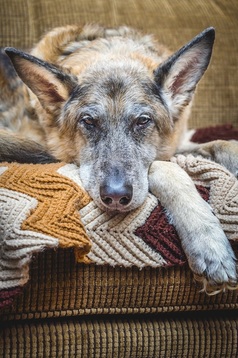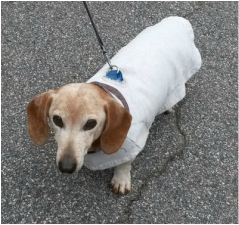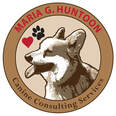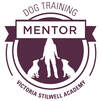A blog for all things dog-related: training, behavior, fun new doggie items, veterinary information and, of course, ways to enhance your relationship with your best four-legged friend!
Dr. Alisha Selzner of Companion Pet Hospital in Fishkill is dedicated to helping people understand how to work with their senior pets. “I always tell people that age is not a disease. Unfortunately, as we age and as our pets age, we start to accumulate more problems that have to be managed in order to maintain a good quality of life. Geriatric dogs can be prone to arthritis, loss of hearing, ocular conditions that lead to loss of vision, kidney failure, heart disease (leaky heart valves, thickened heart muscle, weakened heart muscle), thyroid conditions, cancerous processes, and other issues as well.” One such condition that can be common in older dogs is Geriatric Dog Vestibular Disease or Idiopathic Vestibular disease. What exactly does this mean? Dr. Selzner explains, “In general, vestibular disease is similar to vertigo in people. A dog’s balance and sense of orientation in space can be altered. Patients with vestibular disease often have a head tilt, nystagmus (abnormal horizontal eye movements), and may vomit or decline to eat due to nausea associated with dizziness. Vestibular disease can be linked with an inner or middle ear infection, or in rare circumstances can be due to a brain tumor. However, the most common form of vestibular disease in dogs is Idiopathic or Geriatric Dog Vestibular disease, which occurs in senior pets for an unknown reason.”
There is a lot to be said for preventative care rather than waiting for your dog to develop a concern before taking action. Much like how many of our elderly family members require frequent doctor’s visits to keep tabs on any impending health concerns, it is also imperative to have your dog examined by a veterinarian at least annually - twice a year for our senior and geriatric pets. Dr. Selzner advises, “These appointments should consist of a thorough physical exam, a 4Dx test annually (to check for heartworm disease and tick-borne diseases), a fecal exam annually (to test for intestinal parasites), a urinalysis biannually (to evaluate your pet’s kidney and bladder health), a CBC/Chemistry biannually (to evaluate red and white blood cells / liver and kidney function), a T4 biannually (to assess for adequate thyroid function), and potentially a blood pressure in geriatric pets. These preventative care or wellness visits with your veterinarian will help promote early detection of potential problems, maximize your pet’s health, and improve their quality of life.” What about caring for our canine friends who are losing their hearing or sight, as so often occurs with age? Dr. Selzner advises consulting your veterinarian for a definitive diagnosis and to see if there is anything that can be done to improve their condition and quality of life. Most of the time, these aging concerns are irreversible but, she says, there are some things we can do on our own to be more cognizant of our dogs’ needs and make their lives a little easier… When a Dog Loses His Hearing
When a Dog Loses His Sight
Sometimes, adjusting to living with a dog whose sight or hearing is declining can be a difficult transition. For extra support, you should contact your veterinarian, a behaviorist, or a trainer to help you make the best of the situation for both you and your dog. There are also numerous books and resources available to help you adjust to living with a blind or deaf pet.
0 Comments
Your comment will be posted after it is approved.
Leave a Reply. |
AuthorMaria Huntoon, CBCC-KA Archives
April 2020
Categories |



 RSS Feed
RSS Feed






